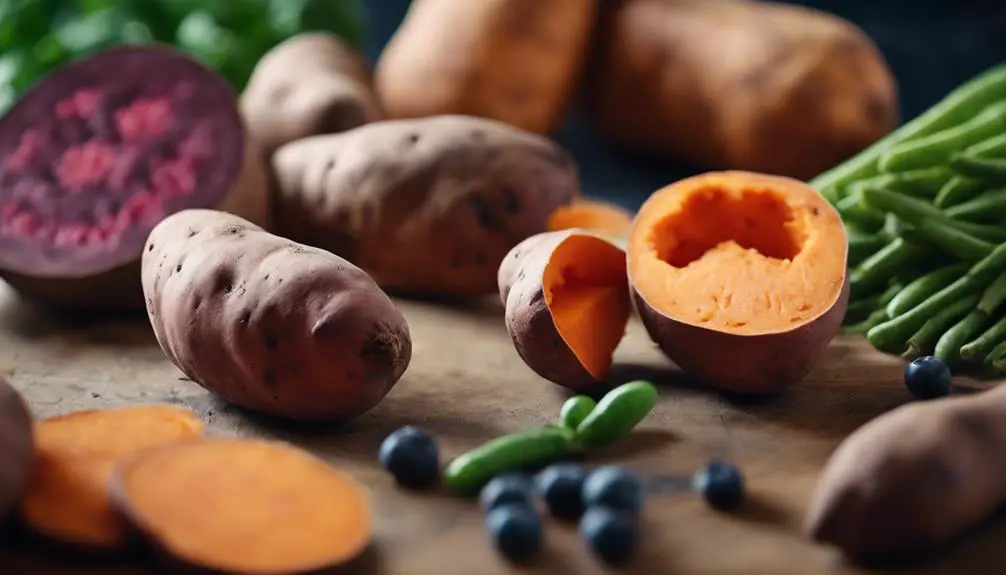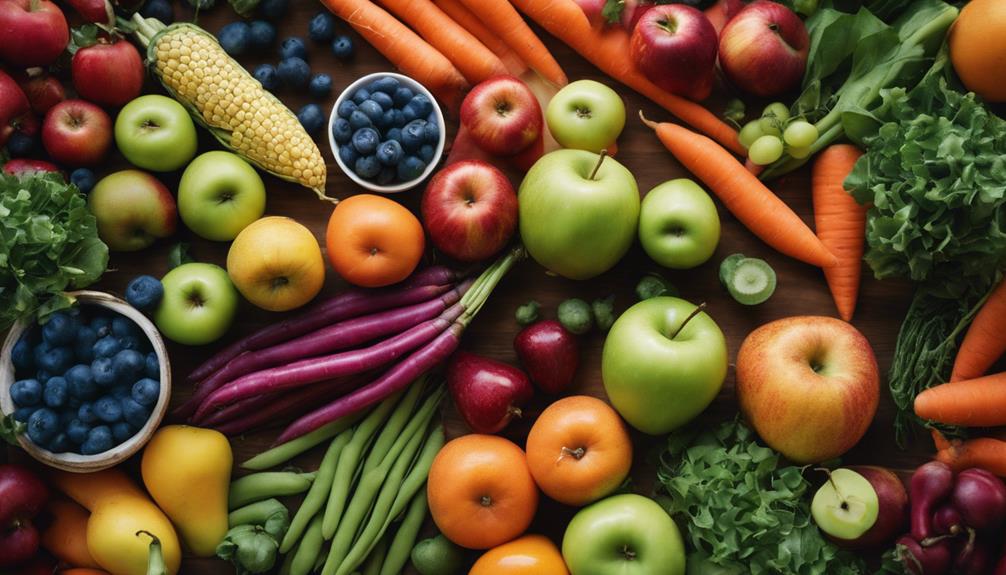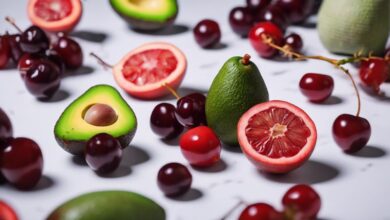What Fruits and Vegetables Can Dogs Eat
Your furry friend can enjoy apples, carrots, blueberries, spinach, and sweet potatoes. Apples are packed with nutrients but remove the seeds. Carrots are low in calories and great for dental health. Blueberries are full of antioxidants to boost the immune system. Spinach offers essential vitamins but should be fed in moderation. Sweet potatoes are rich in vitamins and antioxidants but require caution for safe consumption. Pay attention to portion sizes and potential toxic parts to make sure your dog stays healthy. More helpful details on safe fruits and veggies for your canine companion await.
Key Takeaways
- Dogs can eat apples, but remove seeds due to cyanide.
- Carrots are safe, nutritious, and aid dental health.
- Blueberries provide antioxidants and boost the immune system.
- Spinach is rich in vitamins but should be fed in moderation.
- Sweet potatoes are nutritious but require thorough cooking and portion control.
Apples

Apples are a nutritious and safe fruit for dogs to consume in moderation. The fruit itself is packed with essential vitamins and minerals that can benefit your furry friend's health. However, when it comes to apple seeds, caution is necessary. Apple seeds contain cyanide, which is toxic to dogs if consumed in large quantities. It is best to remove the seeds before giving your dog any apple slices. Opting for apple slices as a treat is a great choice due to their crunchy texture and natural sweetness. Remember to feed them in moderation to prevent any digestive issues. Overall, apples can be a healthy and tasty snack option for your canine companion when served appropriately.
Carrots
Carrots are a rich source of essential nutrients and can be a beneficial addition to your dog's diet when served appropriately. These crunchy treats are not only low in calories but also high in fiber, promoting digestive health in your furry friend. Carrots are packed with antioxidants, such as beta carotene, which supports your dog's immune system and promotes healthy skin and coat. Additionally, the chewing action required to eat carrots can help improve your dog's dental health by reducing plaque and tartar buildup. Offering your dog carrots as a healthy snack can be a great way to provide them with vitamins A, K, and potassium while keeping their taste buds satisfied.
Blueberries

Blueberries are a nutrient-rich fruit that can offer several health benefits to your canine companion when incorporated into their diet appropriately. Can dogs eat blueberries? Yes, they can! Blueberries are packed with antioxidants, vitamins C and K, and fiber, making them a great addition to your dog's diet. The antioxidants in blueberries can help boost your dog's immune system and reduce inflammation. The fiber content aids in digestion and can contribute to overall gut health. Additionally, the vitamins present in blueberries support various bodily functions. When feeding your dog blueberries, remember to offer them in moderation to prevent any potential digestive issues. Overall, blueberries are a tasty and nutritious treat that can benefit your furry friend's well-being.
Spinach
Spinach is a leafy green vegetable that can be a valuable addition to your dog's diet due to its rich nutrient content. This superfood is packed with essential vitamins such as A, C, and K, as well as minerals like iron and calcium, which can contribute to your dog's overall health. To guarantee maximum nutrient retention, lightly steam or sauté the spinach before feeding it to your furry friend. However, be cautious with portion sizes, as excessive consumption of spinach can lead to potential health risks such as kidney issues due to its oxalate content. Moderation and portion control are key when incorporating spinach into your dog's diet to reap its nutritional benefits safely.
Sweet Potatoes

Sweet potatoes are an important and essential option worth adding to your dog's diet because of their rich source of vitamins and minerals. These root vegetables are packed with fiber, vitamin A, vitamin C, and antioxidants that can benefit your furry friend's overall health. When feeding sweet potatoes to your dog, it's best to cook them thoroughly to improve digestibility. Boiling or baking without any seasoning is the ideal way to prepare sweet potatoes for your canine companion. However, remember that moderation is key when introducing new foods. Excessive consumption of sweet potatoes can lead to digestive issues due to their high fiber content. Hence, it's vital to practice portion control and monitor your dog for any adverse reactions when incorporating sweet potatoes into their diet.

If Richie Bedard is a dog food expert, author, or any other figure in the field of dog nutrition that emerged after September 2021,






